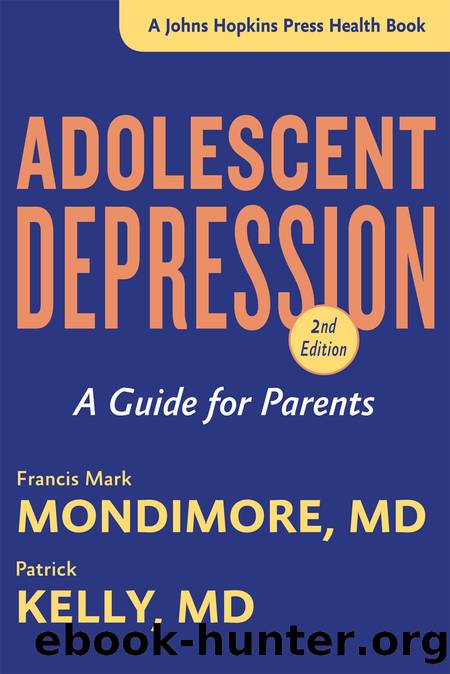Adolescent Depression by Francis Mark Mondimore

Author:Francis Mark Mondimore
Language: eng
Format: epub
Publisher: Johns Hopkins University Press
Published: 2015-01-14T16:00:00+00:00
IS PSYCHOTHERAPY ALONE SUFFICIENT?
A number of reasonably well-designed clinical studies show that some forms of psychotherapy are by themselves effective treatments for many cases of adolescent depression. Itâs difficult, however, to decide from these studies which cases of adolescent depression can be successfully treated with psychotherapy alone. It seems clear from this work that psychotherapy alone is not effective for the treatment of severe depression.
Some studies showing that psychotherapy is successful in treating adolescents with depression have recruited their research subjects from schools by means of screening questionnaires that identified students with symptoms of depression. Often, comparisons are made between a group of adolescents who receive treatment and a group who are put on a waiting list, that is, those receiving no treatment at all. Given that it would be unethical to identify individuals with a serious medical problem and then not get them into treatment quickly, we can assume that the adolescents in many of these studies were, by and large, not severely depressed.
Some studies have actually excluded severely depressed adolescents right up front. A 1996 study titled âA Controlled Trial of Brief Cognitive-Behavioral Intervention in Adolescent Patients with Depressive Disordersâ (cognitive-behavioral therapy is a specific type of psychotherapy that we discuss later in this chapter) found that psychotherapy had a âclear advantageâ in a group of depressed adolescents.1 In this study, research subjects were chosen from individuals applying to an outpatient clinic specializing in adolescent depression. Although this would suggest that a group of more seriously depressed young people was being studied, a closer reading of this paper reveals that any adolescent âtaking or likely to require antidepressant medicationsâ was excluded from the study. Almost always, studies of children and adolescents exclude severe symptoms (psychosis, suicidality), which are usually associated with more severe depressive episodes.
Rather than focusing entirely on which patients psychotherapy can help, several studies of the treatment of adolescent depression with psychotherapy have tried to figure out why this treatment doesnât help some patients. One such study attempted to compare the efficacy of several different types of therapy in 12- to 18-year-olds with major depression.2 It found that therapy was not very helpful for 21 percent of the adolescents who had been recruited into the study. These subjects had chronic depressive symptoms during 80 percent of the time the study was conductedâover a period of about two years. (This study had already eliminated more difficult to treat and severely ill patients by excluding adolescents with bipolar disorder, substance abuse, and other complicating factors.) The researchers reported that the subjects who did not respond to psychotherapy treatment had been assessed at the beginning of the study as being more severely depressed.
A study titled âWhich Depressed Patients Respond to Cognitive-Behavioral Treatment?â also found that the nonresponders were the subjects who were more depressed at the beginning of the study.3 This study also measured âimpairmentâ in the subjects at the beginning of the treatment and found that adolescents who were having more trouble functioning in school and at home were less likely to benefit from psychotherapy.
Download
This site does not store any files on its server. We only index and link to content provided by other sites. Please contact the content providers to delete copyright contents if any and email us, we'll remove relevant links or contents immediately.
Should I Stay or Should I Go? by Ramani Durvasula(7641)
Why We Sleep: Unlocking the Power of Sleep and Dreams by Matthew Walker(6686)
Fear by Osho(4723)
Flow by Mihaly Csikszentmihalyi(4671)
Rising Strong by Brene Brown(4435)
Why We Sleep by Matthew Walker(4421)
The Hacking of the American Mind by Robert H. Lustig(4356)
How to Change Your Mind by Michael Pollan(4340)
Too Much and Not the Mood by Durga Chew-Bose(4321)
Lost Connections by Johann Hari(4163)
He's Just Not That Into You by Greg Behrendt & Liz Tuccillo(3873)
Evolve Your Brain by Joe Dispenza(3653)
The Courage to Be Disliked by Ichiro Kishimi & Fumitake Koga(3472)
Crazy Is My Superpower by A.J. Mendez Brooks(3380)
In Cold Blood by Truman Capote(3366)
Resisting Happiness by Matthew Kelly(3331)
What If This Were Enough? by Heather Havrilesky(3298)
The Book of Human Emotions by Tiffany Watt Smith(3284)
Descartes' Error by Antonio Damasio(3263)
